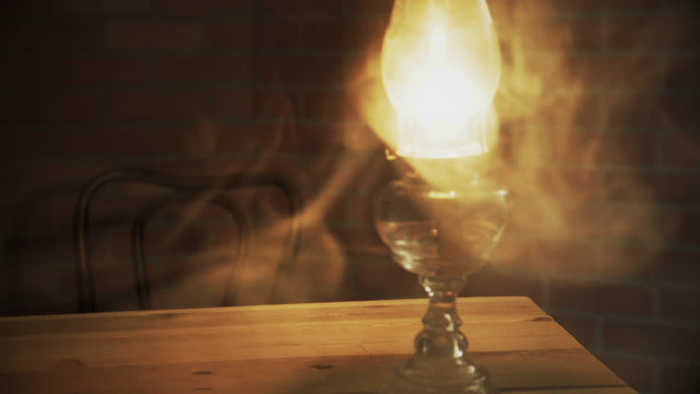FWP:
SETS == PETRIFIED PHRASES
For background see S. R. Faruqi's choices. This verse is NOT one of his choices; I thought it was interesting and have added it myself. For more on Ghalib's unpublished verses, see the discussion in {4,8x}.
For another verse about the smoke of the lamp, see {33,4}.
Gyan Chand is surely right that manzil-e maq.suud must have been what first occurred to the poet, because it is such a common 'petrified phrase' that in such a context it is just what would occur to anybody, from that day to this. (There is even a novel with that title.) But if Ghalib ended up with manzil-e maq.sad , both the grammar ('the destination that is the goal/purpose') and the meaning still work perfectly well. And there's no reason to believe he would have felt unhappy with it, or at all constrained. It's just different enough to evoke the petrified version of the phrase-- but then also to de-familiarize it, so that we're obliged to encounter the meaning afresh. And that's just the kind of thing Ghalib delights in doing in any case.
As Gyan Chand also notes, there's no reason to separate the two lines, since the whole verse can either be about an oil lamp (and its metaphorical 'journey' toward being blown out at daybreak), or else about the speaker's lifespan (and his metaphorical journey through the 'night' of life to the 'daybreak' of death). The refrain aaj doesn't fit very well, however, since the smoky oil lamp would only be lit at night.
Especially in this latter case, the usual metaphorical relationship of life as a day, and death as the night that ends it, is intriguingly inverted. A similar trick is played, more richly and powerfully, in {78,7}. And there's always Mir's M{7,2}.
It's also enjoyable to imagine the poet as sitting up all night to struggle with the process of composition, so that even within his own home or chamber [;xaanah], sitting at his table by the light of his smoky lamp, he is on the (mental, imaginative) road. In fact to him the lamp-smoke is like opium, as in {33,4}.

Asi:
By daybreak I must arrive at my desired destination. The smoke of the lamp of my home seems to me to be the dust of travel-- whether the desired destination is one that I have resolved to reach by daybreak, or whether it is death, such that by daybreak I will be finished off and will complete the journey of my life.
== Asi, p. 104